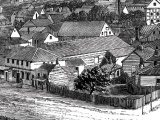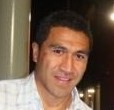30 BC Battle of Alexandria: Mark Antony achieved a minor victory over Octavian’s forces, but most of his army subsequently deserted, leading to his suicide.
781 The oldest recorded eruption of Mt. Fuji.
904 Thessalonica fell to the Arabs, who destroyed the city.
1009 Pope Sergius IV became the 142nd pope, succeeding Pope John XVIII.
1200 Attempted usurpation of John Komnenos the Fat.
1423 Hundred Years’ War: Battle of Cravant – the French army was defeated at Cravant.
1451 Jacques Cœur was arrested by order of Charles VII of France.
1492 Jews were expelled from Spain when the Alhambra Decree took effect.
1498 On his third voyage to the Western Hemisphere, Christopher Columbus became the first European to discover the island of Trinidad.
1658 Aurangzeb was proclaimed Moghul emperor of India.
1667 Treaty of Breda ended the second Anglo-Dutch War.
1703 Daniel Defoe was placed in a pillory for the crime of seditious libel after publishing a politically satirical pamphlet, but was pelted with flowers.
1741 Charles Albert of Bavaria invaded Upper Austria and Bohemia.
1777 Pedro Ignacio de Castro Barros, Argentine statesman and priest, was born (d. 1849).
1777 The U.S. Second Continental Congress passed a resolution that the services of Marquis de Lafayette “be accepted, and that, in consideration of his zeal, illustrious family and connexions, he have the rank and commission of major-general of the United States.”
1790 First U.S. patent was issued to inventor Samuel Hopkins for a potash process.
1800 Friedrich Wöhler, German chemist and founder of organic chemistry, was born (d. 1882).
1803 John Ericsson, Swedish inventor and engineer, was born (d. 1889).
1843 – The foundation stone was laid for New Zealand’s first purpose-built theatre, the Royal Victoria Theatre on Manners St, Wellington.

1856 Christchurch, New Zealand, was chartered as a city.
1860 Mary Vaux Walcott, American artist and naturalist, was born (d. 1940).
1865 The first narrow gauge mainline railway in the world opened atGrandchester, Australia.
1895 The Basque Nationalist Party (Euzko Alderdi Jeltzalea-Partido Nacionalista Vasco) was founded by Basque nationalist leader Sabino Arana.
1909 Erik von Kuehnelt-Leddihn, Austrian writer and polyglot, was born (d. 1999).
1912 Milton Friedman, American economist, Nobel laureate (d. 2006).
1913 The Balkan States signed an armistice at Bucharest.
1919 German national assembly adopted the Weimar constitution.
1921 Peter Benenson, British founder of Amnesty International, was born (d. 2005).
1930 The radio mystery programme The Shadow aired for the first time.
1932 The NSDAP won more than 38% of the vote in German elections.
1936 The International Olympic Committee announced that the 1940 Summer Olympics would be held in Tokyo. However, the games were given back to the IOC after the Second Sino-Japanese War broke out, and are eventually cancelled altogether because of World War II.
1938 – Bulgaria signed a non-aggression pact with Greece and other states of Balkan Antanti (Turkey, Romania, Yugoslavia).
1938 Archaeologists discovered engraved gold and silver plates from King Darius in Persepolis.
1940 A doodlebug train in Cuyahoga Falls, Ohio collided with a multi-car freight train heading in the opposite direction, killing 43 people.
1941 Holocaust: under instructions from Adolf Hitler, Hermann Göring, ordered SS General Reinhard Heydrich to “submit to me as soon as possible a general plan of the administrative material and financial measures necessary for carrying out the desired final solution of the Jewish question.”
1943 Lobo, American singer and songwriter, was born.
1944 Geraldine Chaplin, American actress, was born.
1944 – Jonathan Dimbleby, British journalist and television presenter.
1945 Pierre Laval, the fugitive former leader of Vichy France, surrendered to Allied soldiers in Austria.
1945 John K. Giles attempted to escape from Alcatraz prison.
1948 New York International Airport (later renamed John F. Kennedy International Airport) was dedicated.
1951 Japan Airlines was established.
1954 First ascent of K2, by an Italian expedition led by Ardito Desio.
1959 The Basque separatist organisation ETA was founded.
1964 Jim Corr, Irish singer and musician (The Corrs), was born.
1964 Ranger 7 sent back the first close-up photographs of the moon, with images 1,000 times clearer than anything ever seen from earth-bound telescopes.
1970 Black Tot Day: The last day of the officially sanctioned rum ration in the Royal Navy.
1972 – Operation Motorman: British troops moved into the no-go areas of Belfast and Derry. End of Free Derry.
1972 – Three car bombs detonated in Claudy, Northern Ireland, killing nine.
1973 A Delta Air Lines jetliner crashed while landing in fog at Logan Airport, Boston, Massachusetts killing 89.
1976 John Walker won gold in the 1500 metres at the Montreal Olympics.

1976 NASA released the Face on Mars photo.
1978 Will Champion, English musician (Coldplay), was born.
1980 Mils Muliaina, New Zealand rugby union player, was born.
1980 Mikko Hirvonen, Finnish rally driver, was born.
1981 – General Omar Torrijos of Panama died in a plane crash.
1981 A total solar eclipse occured.
1987 A rare, class F4 tornado ripped through Edmonton, Alberta, killing 27 people and causing $330 million in damage.
1988 32 people died and 1,674 injured when a bridge at the Sultan Abdul Halim ferry terminal collapsed in Butterworth, Malaysia.
1991 The Medininkai Massacre in Lithuania. Soviet OMON attacked Lithuanian customs post in Medininkai, killing 7 officers and severely wounding one other.
1992 A Thai Airways Airbus A300-310 crashed into a mountain north of Kathmandu, Nepal killing 113.
1999 Lunar Prospector – NASA intentionally crashed the spacecraft into the Moon, ending its mission to detect frozen water on the moon’s surface.
2002 Hebrew University of Jerusalem was attacked when a bomb exploded in a cafeteria, killing 9.
2006 Fidel Castro handed over power temporarily to brother Raúl Castro.
2007 Operation Banner, the presence of the British Army in Northern Ireland, and the longest-running British Army operation ever, ended.
2012 – Michael Phelps broke the record set in 1964 by Larisa Latynina for the greatest number of medals won at the Olympics.
2014 – Gas explosions in the southern Taiwanese city of Kaohsiung killed at least 20 people and injured more than 270.
Sourced from NZ History Online & Wikipedia




 Posted by homepaddock
Posted by homepaddock 









































